Oregon universities depend on foreign students to help close the funding gap. What happens when the revenue dries up?
The University of Oregon is famous in China, says Xinpei Sun, a 21-year-old advertising major and a native of Weihai, a city of 3 million people in the eastern Shandong province.
“The comments people leave about the school on Baidu are really impressive,” she says.
Baidu, aka Chinese Google, serves some 667 million users a month. They surf the site for goods and services, universities included, and if a product satisfies their growing middle-class appetite, they leave a positive review.
Sun was sold on UO’s academic reputation, but what sealed the deal were positive user comments about the Oregon lifestyle, the friendliness of the students and administration, and how welcoming Eugene is to Chinese students.
In 2014 Sun became a Duck, joining the school’s 3,200 other international students.
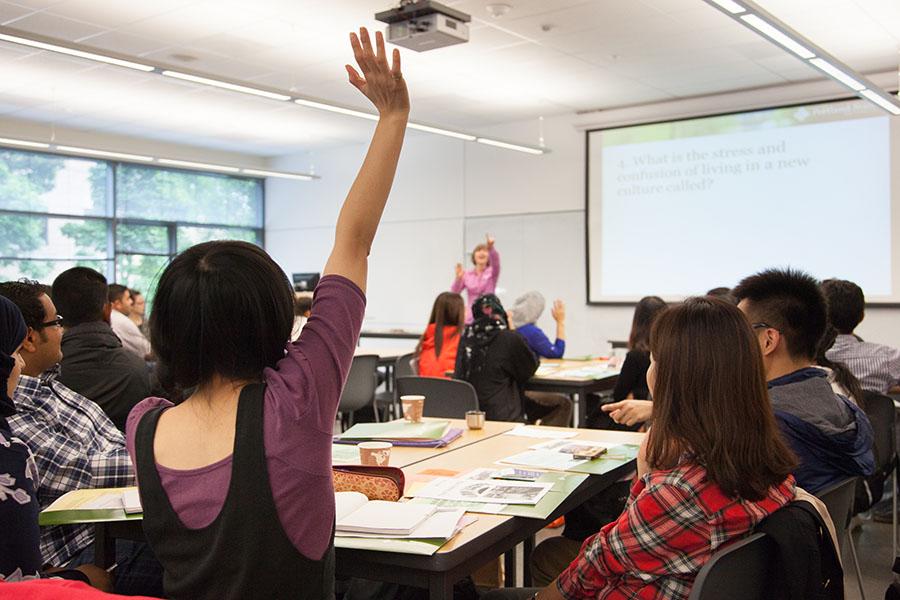
Internationalization has been a growing trend on American college campuses for the last decade, with over a million foreign students currently pursuing higher education here, according to the New York-based Institute of International Education.
The students come for a variety of reasons: a prestigious degree, international experience, better English skills. Many come here to learn how to question, how to push back, how to disrupt. Skills like these are neither taught nor rewarded at most schools back home.
U.S. colleges are reaping the benefits. The multitude of soft reasons to internationalize a campus include creating diversity and preparing local students for a global economy.
But these seem kumbaya-ish when compared to the tangible $36 billion international students inject into the economy.
For reasons that are not entirely clear, Oregon ranks unusually high compared to other states in foreign student recruitment. As a whole, the state has seen a 140% growth rate of foreign students since 2008, compared to a mere 56% nationally.
Education and 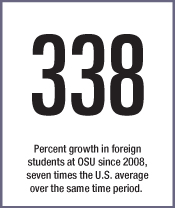 demography trends offer some explanation.
demography trends offer some explanation.
The state’s population overall is growing at a rapid click as Oregon adds jobs faster than the rest of the nation. Population changes on campus also mirror shifts found throughout the state. Asians are now Oregon’s fastest growing demographic, making up 6% of the population.
Then there’s the outsized boost from Oregon State University.
The Corvallis-based institution reports a whopping 338% growth in the number of foreign students since 2008, more than seven times the U.S. average over the same time period.
This made OSU one of the fastest growing U.S. universities for international student visa growth in 2014, according to the Brookings Institution.
As of today, there are close to 4,000 international students from 44 different countries at the Corvallis campus, making up 12% of the total population.
RELATED STORY: Worldly Pursuits — A Bangladeshi’s View
One other reason for Oregon’s high foreign student ranking stands out: The revenue stream helps compensate for longstanding higher-education funding deficits. Only 6% of UO’s budget comes from Salem, compared to the typical 20% to 35% allotted to higher education in other states.
“Attracting international students is a cutting-edge way to survive,” says UO vice provost for international affairs Dennis Galvan.
But dependency on foreign students alarms some Oregon policy makers, especially in a state where many low-income residents are unable to afford to go to college.
Oregon state representative Julie Parrish (R-Beaverton) says she’s concerned about a revenue mix that relies so heavily on out-of-state and international students.
“Since international tuition is high, they’re burdening these students at the highest disproportion of tuition to cover these costs,” she said in an email to Oregon Business.
“The Chinese economy went from 12% growth to 6%, and that was pre-Donald Trump.”
Another conundrum: What happens to UO and Oregon’s six other public universities if that revenue disappears?
Several factors already threaten to chill this hot market. Economic growth in China, by and far the largest exporter of students to the U.S. and Oregon, is slowing, leaving less income to invest in education.
Back home, nationalistic rhetoric from President Trump may scare off other potential candidates.
A drop in international students would be “impactful” to Oregon, says Ben Cannon, executive director of the state’s Higher Education Coordinating Commission. “They are a significant source of revenue and subsidize tuition for resident students.”
RELATED STORY: Worldly Pursuits — A Chinese Perspective
So far, U.S.-wide data on the potential drop of international enrollment next school year is mixed. And really, no one knows what will happen until the new term starts this month — September.
“We expect international enrollment to either flatten or increase slightly next year,” says Mark Hoffman, vice provost, division of international programs for OSU.
The University of Oregon may not be as lucky. Galvan expects numbers for international first-year and transfer students will be down. His reasons are not surprising.
“The Chinese economy went from 12% growth to 6%, and that was pre-Donald Trump,” he says. Most of UO’s international students — 33.5% — are from China, with South Korea and Canada coming in second and third.
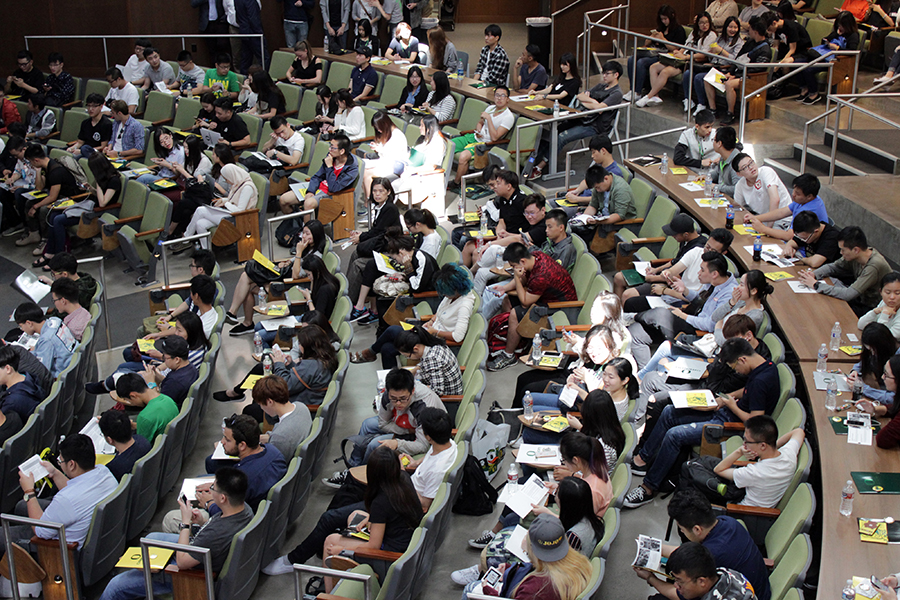
To sell their degrees overseas, University of Oregon officials rely on word of mouth and positive social media reviews.
Portland State University also depends on word-of-mouth, particularly for its electrical engineering and computer science programs. The school also has recruiters who travel internationally. Additionally, PSU works closely with governments that sponsor international students.
The OSU juggernaut takes these strategies one step further: The Corvallis-based institution collaborates with a private company, U.K.-based INTO University Partnerships, to attract and enroll international students.
OSU’s Hoffman declined to discuss financial details 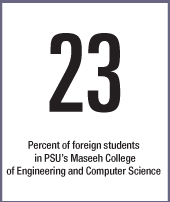 other than to say it’s a 50/50 public/private partnership.
other than to say it’s a 50/50 public/private partnership.
The collaboration has paid off in spades. Prior to inking their 2008 deal, OSU claimed fewer than 1,000 international students compared to the 4,000 today.
“INTO has regional offices throughout the world,” Hoffman says. “We just don’t have that kind of infrastructure in-house.”
RELATED STORY: PRIVATE SECTOR SHAPES EDUCATION REFORM
Founded in 2005, INTO currently partners with 10 U.S. schools. They recruit the students, hire additional faculty and staff and help design English-language and study-skill programs for students who wouldn’t otherwise qualify for direct entry. After completing the three-term INTO OSU’s Pathway program, for example, undergraduates progress to their second year toward a degree.
After years of phenomenal growth at OSU and other American schools, interest in studying in America is waning, says Tim O’Brien, vice president for INTO’s global partnerships.
O’Brien agrees that the rhetoric coming out of the White House is “unhelpful,” but he calls it premature to say any slowdown is a direct consequence of Trump.
“The U.S. is not defined by one Twitter account,” he says.
Unfavorable exchange rates and the drop in the price of oil are among other factors bearing down on international student recruitment, O’Brien says.
Still, he concedes there is rising fear about personal safety, particularly from potential students from India after the February 2017 shooting of two Indian engineers in Kansas.
RELATED STORY: Worldly Pursuits — An Indian’s Voice
Fear doesn’t drive Bhavana Ramesh, a recent graduate of Portland State University’s engineering technology management program.
She could have earned a less expensive post-graduate degree in her native India, like her younger brother did. But she wanted immersion in a culture where minds are open and disrupters are rewarded.
“That doesn’t happen in India,” Ramesh says. “We’re still an ‘arranged-marriage culture.’” 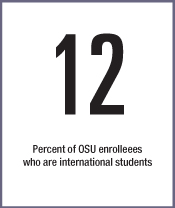
Ramesh is not alone at PSU. The school’s Maseeh College of Engineering and Computer Science enrolls 600 international students, accounting for roughly 23% of enrollment. Most graduate students at Maseeh are from India, a relief to Ramesh but not a surprise.
“I was expecting this,” she says. “When I conducted my research, people said, ‘No worries; you will find other brown people, other Indians.’”
Maseeh College dean Renjeng Su acknowledges that international students are his school’s bread and butter. A drop in applications earlier in the year was alarming and prompted immediate action.
“We responded to admissions earlier than usual, and right now our numbers look good,” he says.
Su says the school enjoys a unique benefit from its proximity to Oregon’s Silicon Forest. Potential graduate students are attracted by a cluster of potential employers, while companies like Intel and Mentor Graphics have a constant supply of trained-up STEM workers. Still, rules and red tape complicate the process. 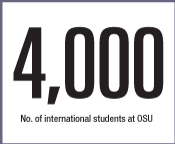
A foreign-student employment program called Curricular Practical Training (CPT) allows a student with an F1 visa to work while studying. After graduation, they can apply for so-called Optional Practical Training and continue to work for 12 months.
STEM workers, however, can extend the visa for another two years. After that, an employer must sponsor the employee’s H-1B visa, which costs up to $5,000.
In 2016 there were 4,135 H-1B applications filed in Oregon. This year the congressionally mandated national cap of 85,000 visas was hit just four days after the new application period opened.
To fill an anticipated gap in STEM-related jobs over the next decade, Oregon adopted the ambitious 40-40-20 goal that asks for 100% high school graduation with 40% of students earning an associate’s degree and another 40% getting a bachelor’s degree or higher.
But progress in meeting the goal has been slow. In 2015 only 37% of fourth-graders scored at or above the proficient level for math. Statewide, graduation rates have barely budged from their dismal lows: 75%, among the worst in the nation.
Homegrowing enough talent in time seems unlikely. Trained in Oregon, foreign students fill the gap. With an OPT in hand, Ramesh currently has a job offer from Boeing through a third-party contractor. She understands the rationale behind the complex immigration process but still finds it frustrating.
“No one is promising me a visa, I get that,” she says, “but it’s a pain point. I’ve invested my time, money, energy and, most importantly, my experience. I’m not just here to study, I want to experience work here too.”

Wanting a tangible return on investment is understandable, considering the high cost international students pay for their Oregon tuition.
PSU foreign-student undergraduation tuition and fees clock in at $37,659 a year; UO, $37,116 and OSU, $49,874. Students take a few predictable paths to pay these costs. Some — from countries like Kazakhstan, Ecuador, Thailand and Libya — may get a free ride, sponsored entirely by their government’s human capital program.
Others, about 5% according to UO’s Galvan, are the stereotypical, insanely rich Asian students, whose parents shell out for everything from tuition to shopping sprees to flashy, high-end cars out of pocket. In fact, Chinese students account for 8% of luxury car sales in the Eugene area, local dealers report.
“These students do stand out,” Galvan says.
Most, however, are nowhere near as flush. They cobble together scholarship packages, work as many hours as their visas will allow and take out loans, often using family homes as collateral, to fund their full-price education.
“The U.S. is not defined by one Twitter account.”
What about the elephant in the living room? Are Oregon students being displaced by better-heeled internationals?
“No,” insists HECC’s Cannon.
Statistics from the organization do show the percentage of resident enrollment in state universities has dropped from 77% in 2006 to 65% in 2016.
But overall enrollment has also grown, and that includes the number of resident students. Cannon says any Oregon student who qualifies for admissions can and will find a spot.
He does concede that that might not be true at UO, where resident admission is down.
The decline, however, is part of a larger strategy to attract the best students. The UO’s Galvan explains that 48% of Ducks are nonresidents, most coming from California and Washington. The university is also looking for untapped U.S. markets, and is making a concerted recruiting effort in Texas.
“It’s the new California,” he says.
The cost of an Oregon education is what bothers many legislators. And some, like Julie Parrish, pin the blame on government inefficiencies, not a dearth of public dollars. Giving universities more flexibility over their health care and pension costs may ease the strain on taxpayers, she says.
“We know that if the seven universities could buy their healthcare outside of PEBB [the public employees benefits board], they could save upwards of $100 million a biennium,” she says.
While restructuring health care would certainly free up some money, international students do more than fund the universities.
A multiplier effect ripples through the surrounding neighborhoods and towns. The Association of International Educators estimates that foreign students created 2,094 direct jobs and 3,382 indirect jobs in Oregon for the 2015-16 academic year. This translates into an economic benefit of $481.7 million for the state.
And then there’s the value of 9,500 international students turned into Oregon ambassadors.
An American degree is undeniably valuable, but brand-name schools like Princeton or UC Berkeley will always have a competitive edge. Oregon schools have enjoyed success by leveraging the Oregon brand, selling open-mindedness and a smile alongside curriculum and rigor.

During the 2014-2015 school year, the Beaverton School District became a minority majority institution, with the second largest group being Asian Americans.
Oregon is becoming more international, more diverse, more Asian. So it makes sense that our public universities are too.
To be sure, the foreign student dynamic raises concerns about accessibility for college-bound Oregonians. But it has also sustained state universities in a resource-constrained environment.
And as foreign economies cool and political rhetoric heats up, a relationship hangs in the balance.
A version of this article appears in the September issue of Oregon Business.






